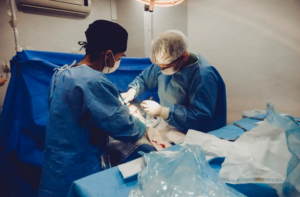Rotator Cuff Surgery: The Different Types You May Need

If you are experiencing pain in your shoulder and have been diagnosed with a rotator cuff tear, you may be wondering what type of surgery will be best for you. There are several torn rotator cuff surgery types available, and the right one for you will depend on the severity of your injury. This blog post will discuss the different types of rotator cuff surgery and their benefits.
Open Rotator Cuff Repair
 The most common type of rotator cuff surgery is an open rotator cuff repair. This type of surgery can treat a tear in the rotator cuff tendons. The surgeon will make an incision in the shoulder and then reattach the torn tendon to the bone. Also, the surgeon may need to remove damaged tissue or bone spurs. This type of surgery usually requires one or two days of hospital stay. The benefits of an open rotator cuff repair include a quicker recovery time and a lower risk of re-injury.
The most common type of rotator cuff surgery is an open rotator cuff repair. This type of surgery can treat a tear in the rotator cuff tendons. The surgeon will make an incision in the shoulder and then reattach the torn tendon to the bone. Also, the surgeon may need to remove damaged tissue or bone spurs. This type of surgery usually requires one or two days of hospital stay. The benefits of an open rotator cuff repair include a quicker recovery time and a lower risk of re-injury.
Arthroscopic Rotator Cuff Repair
Arthroscopic rotator cuff repair is a less invasive type of surgery that is used to treat small tears in the rotator cuff tendons. The surgeon will make small incisions in the shoulder and insert a camera into the shoulder joint. The surgeon will then use special instruments to repair the tear. This type of surgery usually requires one or two days of hospital stay. The benefits of arthroscopic rotator cuff repair include a quicker recovery time, a lower risk of infection, and less scarring.
Mini-Open Rotator Cuff Repair
 Mini open rotator cuff repair is a less invasive type of surgery that is used to treat small tears in the rotator cuff tendons. The surgeon will make a small incision in the shoulder and then insert a camera into the shoulder joint.
Mini open rotator cuff repair is a less invasive type of surgery that is used to treat small tears in the rotator cuff tendons. The surgeon will make a small incision in the shoulder and then insert a camera into the shoulder joint.
The surgeon will then use special instruments to repair the tear. Mini-open rotator cuff repair benefits include a quicker recovery time, a lower risk of infection, and less scarring. This type of surgery does not require a general anesthetic.
All three types of rotator cuff surgery have benefits and risks. It is essential to discuss these with your surgeon before making a decision. The right kind of surgery for you will depend on the severity of your injury and your overall health. If you are considering rotator cuff surgery, we encourage you to schedule a consultation with one of our experienced orthopedic surgeons. We will be able to assess your injury and provide you with a treatment plan that is best for you. Contact us today to get started.


